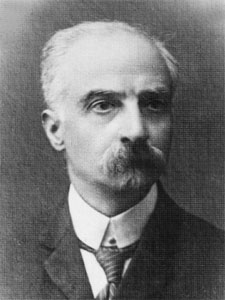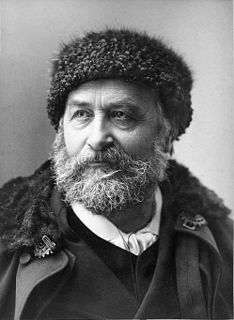Related Research Articles

Errico Malatesta was an Italian anarchist and revolutionary socialist. He spent much of his life exiled from Italy and in total spent more than ten years in prison. Malatesta wrote and edited a number of radical newspapers and was also a friend of Mikhail Bakunin.

Barthélemy Charles Joseph Dumortier was a Belgian who conducted a parallel career of botanist and Member of Parliament.
The International Anarchist Congress of Amsterdam took place from 24 August to 31 August 1907. It gathered delegates from 14 different countries, among which important figures of the anarchist movement, including Errico Malatesta, Luigi Fabbri, Benoît Broutchoux, Pierre Monatte, Amédée Dunois, Emma Goldman, Rudolf Rocker, Christiaan Cornelissen, et al.

Pierre Monatte was a French trade unionist, a founder of the Confédération générale du travail at the beginning of the 20th century, and founder of its journal La Vie Ouvrière on 5 October 1909. Monatte has been considered one of the great figures of revolutionary syndicalism.

Alexandre Lacassagne was a French physician and criminologist who was a native of Cahors. He was the founder of the Lacassagne school of criminology, based in Lyon and influential from 1885 to 1914, and the main rival to Lombroso's Italian school.

Francesco Saverio Merlino was an Italian lawyer, anarchist activist and theorist of libertarian socialism.
Luc de Heusch was a Belgian filmmaker, writer, and anthropologist, professor emeritus at the Free University of Brussels. His 1967 film Thursday We Shall Sing Like Sunday was entered into the 5th Moscow International Film Festival.

François Charles de Velbrück was a German ecclesiastic. He was prince bishop of Liege from 16 February 1772 to 1784.

Élie Reclus was a French ethnographer who studied what were then called primitive cultures, and an anarchist.
Giovanni Defendi was an Italian revolutionary who fought for the Paris Commune, was imprisoned, and after release spent many years as a grocer and anarchist leader in exile in London.
Osvaldo Gnocchi-Viani was an Italian journalist and a member of the First International. Later he entered mainstream democratic politics as a Socialist. He is known for his work in introducing chambers of labor into Italy.
Lodovico Nabruzzi was an Italian journalist and anarchist. He played a leading role in the dissensions between the revolutionary and evolutionary Italian socialists. He spent several years in exile in Switzerland and France, often forced to undertake menial work and often in trouble with the authorities. After returning to Italy his life continued to be difficult, and he suffered from mental health problems. Although he married and had four children the marriage did not last. He died alone in a public hospital.

Joseph Favre was a famously skilled Swiss chef who worked in Switzerland, France, Germany, and England. Although he initially only received primary education because of his humble origins, as an adult he audited science and nutrition classes at the University of Geneva, and would eventually publish his four-volume Dictionnaire universel de cuisine pratique, an encyclopedia of culinary science, in 1895.
The following lists events that happened during 1884 in the Kingdom of Belgium.
Adolphe Bloch (1882–1969) was a 20th-century French biological and racialist anthropologist as well as a Turkologist, and member of the Society of Anthropology of Paris.
Events in the year 1844 in Belgium.
The following lists events that happened during 1878 in the Kingdom of Belgium.

The Société des douze was scholarly and literary dining club in Brussels.
Anarchism in Belgium began to spread after the fall of the Paris Commune, when many Communards, including Élisée Reclus, took refuge in Brussels. At the time, the Belgian César de Paepe defended a mutualism inspired by Pierre-Joseph Proudhon, which proposed to organize production and distribution by relying on independent workers' associations without the intermediary of the State.

Jean Jamin was a French ethnologist and anthropologist. Director of studies at the School for Advanced Studies in the Social Sciences, he taught ethnology there from 1993 to 2016. He directed the journal L'Homme from 1996 to 2015 and co-founded the journal Gradhiva in 1986 alongside Michel Leiris. In the mid-1990s, he became a specialist in the study of the relationship between anthropology and literature, as well as between opera, jazz, popular music, and folk music.
References
Citations
- 1 2 3 4 5 6 7 8 9 10 Zanardelli Tito: ABMO.
- ↑ Dipaola 2004, p. 54.
- ↑ Toda 1988, p. 108.
- ↑ Sur les traces de Malatesta 2010.
- ↑ Toda 1988, p. 94.
- ↑ Zanette 2012, p. 80.
- ↑ Vincent 1992, p. 55.
- ↑ Steenson 1991, pp. 119–120.
- ↑ Vuilleumier 1965, p. 74.
- ↑ Vuilleumier 1965, p. 75.
- ↑ Criniti 1979, p. 534.
- ↑ Zanardelli 1891.
Sources
- Criniti, Nicola (September–December 1979). "I " Bagaudae " Nella Propaganda Internazionalista di Tito Zanardelli". Aevum. Università Cattolica del Sacro Cuore. 53 (3): 533–536. JSTOR 25821973.
- Dipaola, Pietro (April 2004). "The 1880s and the International Revolutionary Socialist Congress". Italian Anarchists in London (PDF). Retrieved 2013-08-28.
- Steenson, Gary P. (1991-06-15). After Marx, Before Lenin: Marxism and Socialist Working-Class Parties in Europe, 1884-1914. University of Pittsburgh Pre. p. 119. ISBN 978-0-8229-7673-8 . Retrieved 2013-09-02.
- "Sur les traces de Malatesta". A Contretemps. January 2010. Retrieved 2013-09-01.
- Toda, Misato (1988). Errico Malatesta da Mazzini a Bakunin: la sua formazione giovanile nell'ambiente napoletano (1868-1873). Guida Editori. p. 94. ISBN 978-88-7042-915-2 . Retrieved 2 September 2013.
- Vincent, K. Steven (1992-01-01). Between Marxism and Anarchism: Benoît Malon and French Reformist Socialism. University of California Press. p. 55. ISBN 978-0-520-91140-6 . Retrieved 2013-09-02.
- Vuilleumier, Marc (1965). "Paul Brousse et son passage de l'anarchisme au socialisme". Cahiers Vilfredo Pareto. 3 (7/8): 63–80. JSTOR 40368711.
- "Zanardelli Tito". L'Internazionale italiana fra libertari ed evoluzionisti. Archivio Biografico del Movimento Operaio. Retrieved 2013-09-01.
- Zanardelli, Tito (1891). "Langues & Dialectes" . Retrieved 2013-09-02.
- Zanette, Enrico (2012). "Usages politiques des récits de vie". Politische Kommunikation: Von der klassischen Rhetorik zur Mediendemokratie. Communication politique: De la rhétorique classique à la démocratie des médias. LIT Verlag Münster. p. 80. ISBN 978-3-643-11742-7 . Retrieved 2013-09-02.